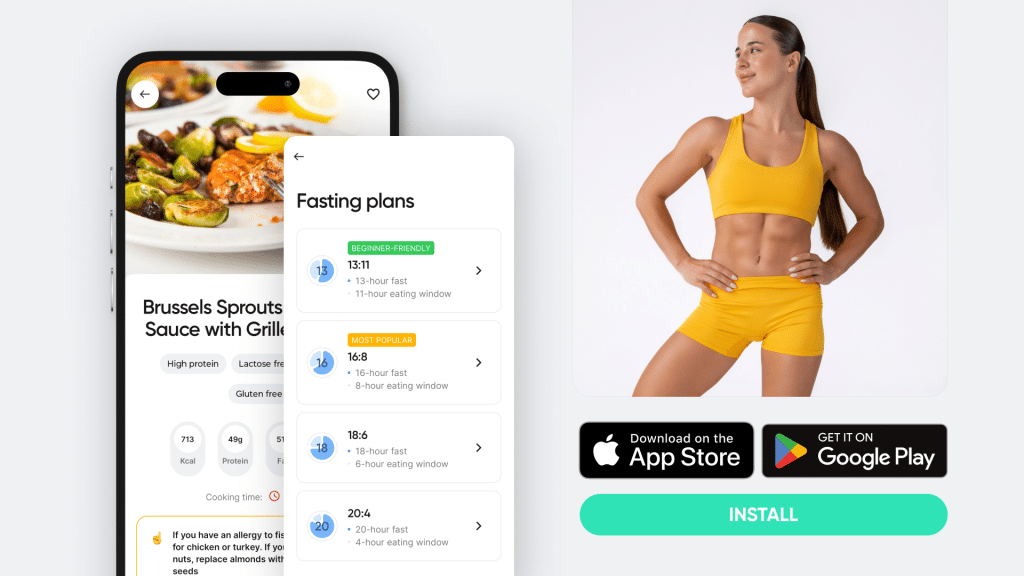The benefits of intermittent fasting for women will lock you into the easiest time-restrictive eating pattern. Understandably, you’d love to know what you’re getting into before trying intermittent fasting. Curiosity is most welcome.
Intermittent fasting (IF) benefits for women may include weight loss and other benefits, but intermittent fasting isn’t for every woman. Let’s examine the benefits and potential risks before showing you how to reap the advantages with the proper program.
Benefits of Intermittent Fasting for Women
The right intermittent fasting for women may unleash these benefits:
- Weight loss (12)
- Burns fat (9)
- Reduces visceral belly fat (8)
- Lower the risk for type II diabetes (8)
- Improve mood (10)
- Protect your heart (7)
- Fight inflammation (7)
- Reduce the signs of aging (16)
- Decrease the risk of cancer (15)
- Reduce the risk of Alzheimer’s Disease (4)
However, IF has pros and cons, depending on age and health. Let’s expand the benefits better to ensure you know what to do and how to master intermittent fasting.
Understanding the Benefits of Intermittent Fasting for Women
Intermittent fasting has long been claimed to be beneficial for women. However, some benefits require knowing which fasting programs are most appropriate because women have hormones to consider. Let’s see the general benefits before diving into female-related pros and cons.
Whether you’re a workout beast or just a beginner making your first foray into the world of fitness and dieting – BetterMe has a lot to offer to both newbies and experts! Install the app and experience the versatility first-hand!
Intermittent Fasting for Weight Loss
A scientific review from the University of California examined multiple studies connecting weight loss to intermittent fasting (12). They reviewed how modified, alternate-day, and time-restricted fasting influenced weight loss.
Time-restricted fasting included individuals fasting overnight for 11 or more hours. In one of the studies reviewed, these individuals lost 2.1% of their body weight in two weeks. Meanwhile, modified fasting, like the 5:2 method, restricts your weekly calories to 20-25% on two non-consecutive days.
You eat roughly 500 calories on energy-restricted days. The review found studies showing how individuals lost 3.2-8% of their body weight in 8-12 weeks (12). However, a small group of individuals unsurprisingly battled hunger on the low-calorie days.
Finally, alternate-day fasting is when you eat one day and fast the next. People typically eat whatever they want every second day and go hungry every other day. Individuals lost 2.5% of body weight over 22 days in one study (12). Unfortunately, many individuals felt excessively hungry on fasting days, which lasted beyond the fasting period.
In summary, time-restricted fasting with a fasting period of 11 hours or more may be the easiest version of IF for weight loss. In this way you are less likely to feel excessively hungry, or to feel like you have no energy. It’s the ideal balance for women trying to lose weight without overly disrupting their lifestyles or their hormones.
Does fasting for 16 Hours Burn Fat for Women?
Johns Hopkins Medicine describes a concept called metabolic switching (9). When you go several hours without food, your body burns through the calories and glucose you previously ate for energy before turning to fat stores. Your metabolism changes or “switches” to burning fat for fuel instead of glucose.
Many experts believe that 16 hours of fasting is long enough to switch from glucose to fat as fuel for most people, however the exact timing may vary by individual.
Does Intermittent Fasting Work for Women’s Belly Fat?
Belly fat can be subcutaneous, meaning under the skin, or visceral, which surrounds your organs. Having excess visceral fat is considered a health risk because it is related to diseases like diabetes and other chronic diseases. Researchers in Chicago reviewed intermittent fasting (IF), compared to calorie restriction (CR) for diabetes prevention. One of the factors they looked at was visceral fat loss (8).
In the studies they reviewed, calorie restriction resulted in greater weight loss. However, IF and CR programs similarly reduced visceral fat, insulin resistance, and fasting insulin levels to suggest a potential decrease in the risk of type II diabetes. More research is necessary, but the results have shown how IF can burn visceral fat similarly to other methods of calorie restriction.
Still, you must understand that you can reduce fat realistically. How can you burn belly fat with intermittent fasting, then? Johns Hopkins Medicine recommends the following lifestyle changes to IF to burn fat anywhere in your body (1):
- Eat fewer carbs during your eating window, especially refined carbs and added sugars
- Replace sugar with high-fiber and high-protein foods
- Avoid or limit ultra processed foods in your eating window
- Exercise moderately for 30-60 minutes almost every day
- Add strength training for lean muscle mass
Intermittent Fasting May Improve Your Mood
A review published in Nature examined the relationship between metabolic switching and brain health (10). The researchers found that metabolic switching may help to produce the brain-derived neurotrophic factor (BDNF) hormone, which is essential for brain health and function. They also found that metabolic switching may promote neuroplasticity and resistance of the brain to injury and disease.
Intermittent Fasting May Improve Heart Health
Choosing the right fasting program may help protect your heart. Pakistan researchers reviewed the effects of intermittent fasting on various disease risks (7). They found that IF programs may help reduce oxidative stress which is commonly related to heart disease and other chronic diseases.
Intermittent Fasting May Reduce Inflammation
The Pakistan review also found intermittent fasting may reduce inflammation (7). Inflammation is another crucial factor related to many chronic diseases. Reducing chronic inflammation is thought to help reduce the risk of some of those diseases.
Read more: Bone Broth Fasting: A Comprehensive Guide To Its Benefits And How-To.
Intermittent Fasting May Slow Aging
Oxidative stress is one factor that contributes to aging.. However, fasting may also help promote cellular regeneration and repair.. Iranian researchers reviewed the literature on how fasting impacts cellular regeneration and repair (16). Fasting is thought to promote autophagy, where the body eliminates and recycles damaged cells and tissue.
Intermittent Fasting May Decrease Disease Risks
Scientists from Israel studied the relationship between autophagy and neurodegenerative disorders (4). Deregulated autophagy might be involved in the development of Alzheimer’s Disease, Parkinson’s, and Huntington’s Disease. Intermittent fasting might assist in promoting regeneration and cell recycling through autophagy.
Intermittent Fasting on Women’s Hormones
Women have complex hormone systems and cycles, making IF affect you differently than men. The Cleveland Clinic explains how IF may affect your hormones during your reproductive years (11). It may not be a good option if you’re a woman of childbearing age.
Fasting can prevent the gonadotropin-releasing hormone (GnRH) from regulating estrogen and progesterone throughout the menstrual cycle. You won’t ovulate if estrogen and progesterone can’t rise, and IF may stop the GnRH hormone from stimulating their release.
Low estrogen and progesterone levels in the premenopausal or child-bearing years can cause the following (11):
- Abnormal menstrual cycles
- Acne
- Dry skin
- Hair loss
- Headaches
- Heart palpitations
- Hot flashes
- Infertility
- Insomnia
- Low libido
- Moodiness
Intermittent fasting isn’t healthy for women who rely on reproductive hormones. For example, please don’t follow an IF program if you’re breastfeeding, pregnant, or trying to fall pregnant (11). However, you’ll see how to safely use IF in the coming guidelines if you still have menstrual cycles but aren’t pregnant or breastfeeding.
Intermittent Fasting for Women Over 40
Intermittent fasting for a 40-year-old woman may reveal something exceptional but may also have some setbacks. It depends on whether you’ve entered perimenopause. The Cleveland Clinic states that women typically start perimenopause in the mid-40s (13).
As a woman in her 40s, you stand between two worlds. One is where you’re still producing estrogen and may want children. The other lies in no longer wanting children. Avoid IF programs if you’re still keen on kids because you ovulate during perimenopause.
However, you may consider IF if you’re over the child-bearing stage and able to deal with the lower estrogen levels, possibly adding to your perimenopause symptoms. Remember that intermittent fasting can impact your hormones to make you experience similar symptoms (11). Women over 40 have options regarding the use of IF programs.
Intermittent Fasting for Women Over 50
Intermittent fasting for women over 50 welcomes the benefits with reduced risks. The Cleveland Clinic says IF for women in their 50s and 60s may be more effective because you’d already have low levels of estrogen and progesterone (11).
Losing weight and maintaining your golden years physique is possible. However, remember that some women still have menopause symptoms after 12 months without a menstrual cycle. In that case, IF programs may also add to your menopause symptoms.
Want to build an attention-grabbing bubble butt, blast away fat that’s stored in all the wrong places, spring-clean your diet, turn back the clock on your skin, skyrocket your self-confidence and shatter your insecurities? Check out the BetterMe app and set this plan in motion!
How to Do Intermittent Fasting the Right Way
Intermittent fasting isn’t as simple as you might think. However, these guidelines will help women of all ages use IF safely. Knowing how to do the right IF program can save you from disappointment while keeping you healthy.
Why Is My Stomach Getting Bigger While Fasting?
Unfortunately, intermittent fasting can backfire. Sydney researchers found that every other day fasting in mice led to visceral fat being preserved (14).
Shockingly, the body’s ability to self-preserve during starvation periods changed the abdominal visceral fat after two weeks of alternate-day fasting. The fat resisted being broken down to release fatty acids for energy, although inflammation was still reduced. This was just one study in mice, so its implications are limited. However, it is probably good to keep in mind that any diet or fasting regimen that is too restrictive or too intense may not have the desired effect.
How Many Hours Should a Woman Do Intermittent Fasting?
Let’s compare alternate-day and 16:8 fasting to know which program suits you better. Baton Rouge scientists studied alternate-day fasting (3). The individuals lost weight and body fat, but they continued feeling hungry. Alternate-day fasting may not be a long-term program for women because it’s difficult and uncomfortable. The researchers suggested adding one meal on the fasting days to help make this approach more doable..
On the other hand, Polish scientists studied how the 16:8 IF program helped overweight women over 60 (5). The women lost weight and retained muscle mass. Meanwhile, the study had a lower resignation rate compared to others. The women were more likely to stick it out because they ate enough calories in the 8-hour window. The 16:8 IF plan worked well for those women..
In the end, you have to decide what type or length of fasting fits into your lifestyle and doesn’t make you feel deprived. It may take some trial and error to figure out what works best for you.
How Long Does It Take to See Results From Intermittent Fasting for Women?
Californian researchers reviewed various mechanisms during intermittent fasting periods (6). Mattson and Longo found that studies have been able to demonstrate results such as weight loss or reduced markers of inflammation and oxidative stress in as little as 2-4 weeks of IF, however individual experiences will most certainly vary.
The researchers also suggested that, on average, it takes 3-6 weeks to adapt to a new IF eating regime. This may be the critical transition period for sticking to your IF plan.
Safe Intermittent Fasting for Younger Women
The Cleveland Clinic suggests following safety guidelines and taking it slow if you’re of childbearing age or still have menstrual cycles (11). Start with a 12-hour fast followed by a 12-hour eating window before progressively working your way to a 16-hour fast and an 8-hour eating window.
Also, time your fasting program with your menstrual cycle. Some experts suggest that the best time to start intermittent fasting for a week or two is 1-2 days after your period starts. It will have the least impact on your hormones. Stop fasting within the two weeks before your next period is due. That way, you can still ovulate and avoid stressing your body when it’s more sensitive to cortisol.
16-8 Intermittent Fasting: The Best Option for Women!
The benefits of intermittent fasting for women point to using the 16:8 program. It seems safer and more effective for women of all ages. Harvard also suggests postmenopausal women have more visceral fat around the middle (2). You can use the more balanced 16:8 approach to burn that fat safely with a well-balanced, time-restricted eating plan.
For More Information About Safe Fasting:
FAQs
Is it Better to Skip Breakfast or Dinner in Intermittent Fasting?
It doesn’t matter. Do whatever works better and is easiest for you.
What Is the 8-Hour Eating Window With a 16-Hour Fast?
The 8-hour eating window is when you eat normally but healthily. The 16-hour fasting period is when you consume no calories. For example, you might eat healthy balanced meals between 10:00 and 18:00 daily while avoiding calories from drinks and food overnight.
What Not to Eat While Intermittent Fasting?
You must eat zero calories during the fasting period. Also, try to avoid or limit highly processed foods, refined carbs, and added sugar during your eating period (1). Johns Hopkins Medicine suggests replacing junk food with Mediterranean-style food, like healthy fats, leafy greens, lean protein, and complex carbs during the eating windows (9).
Does Sleeping Count as Fasting?
Sleep is the best time to fast, especially considering how the circadian rhythm and your eating habits align. A review at the University of California found that people who followed prolonged nighttime fasting while they slept lost weight (12).
Does Coffee Break a Fast?
Coffee doesn’t break your fast if you drink the right kind. Johns Hopkins Medicine recommends drinking black coffee without sweeteners during fasting periods (9). The coffee must have low to zero calories. You can also drink tea without creamer or sugar.
Read more: Can Intermittent Fasting Cause Weight Gain?
The Bottom Line
The benefits of intermittent fasting for women require you to understand the pros and cons. IF programs aren’t for every woman, and they may not safely suit your needs. However, if you think IF is right for you, make sure to talk to your healthcare provider and follow the guidelines for safe fasting.
DISCLAIMER:
This article is intended for general informational purposes only and does not serve to address individual circumstances. It is not a substitute for professional advice or help and should not be relied on for making any kind of decision-making. Any action taken as a direct or indirect result of the information in this article is entirely at your own risk and is your sole responsibility.
BetterMe, its content staff, and its medical advisors accept no responsibility for inaccuracies, errors, misstatements, inconsistencies, or omissions and specifically disclaim any liability, loss or risk, personal, professional or otherwise, which may be incurred as a consequence, directly or indirectly, of the use and/or application of any content.
You should always seek the advice of your physician or other qualified health provider with any questions you may have regarding a medical condition or your specific situation. Never disregard professional medical advice or delay seeking it because of BetterMe content. If you suspect or think you may have a medical emergency, call your doctor.
SOURCES:
- 8 Ways to Lose Belly Fat and Live a Healthier Life (n.d., hopkinsmedicine.org)
- Abdominal Fat, and What to Do About It (2019, health.harvard.edu)
- Alternate-Day Fasting in Non-Obese Subjects: Effects on Body Weight, Body Composition, and Energy Metabolism (2005, pubmed.ncbi.nlm.nih.gov)
- Dual Role of Autophagy in Diseases of the Central Nervous System (2019, frontiersin.org)
- Effect of a Six-Week Intermittent Fasting Intervention Program on the Composition of the Human Body in Women over 60 Years of Age (2020, ncbi.nlm.nih.gov)
- Fasting: Molecular Mechanisms and Clinical Applications (2014, cell.com)
- Full Article: Impact of Intermittent Fasting on Human Health: An Extended Review of Metabolic Cascades (2018, tandfonline.com)
- Intermittent Fasting Vs Daily Calorie Restriction for Type 2 Diabetes Prevention: A Review of Human Findings (2014, sciencedirect.com)
- Intermittent Fasting: What Is It, and How Does It Work? (n.d., hopkinsmedicine.org)
- Intermittent Metabolic Switching Neuroplasticity, and Brain Health (2018, nature.com)
- Is Intermittent Fasting Healthy for Women? (2023, health.clevelandclinic.org)
- Metabolic Effects of Intermittent Fasting | Annual Review (2017, annualreviews.org)
- Perimenopause: Age, Stages, Signs, Symptoms, and Treatment (2021, my.clevelandclinic.org)
- Proteomics Analysis of Adipose Depots After Intermittent Fasting Reveals Visceral Fat Preservation Mechanisms (2021, cell.com)
- Targeting Autophagy in Cancer: Advances and Future Directions (2019, aacrjournals.org)
- The Effect of Fasting or Calorie Restriction on Autophagy Induction: A Review of the Literature (2018, sciencedirect.com)











